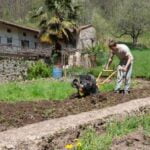Proper watering is crucial for the health and success of vegetable gardens. Knowing when to water vegetable gardens is key in ensuring that your plants receive the right amount of moisture to thrive. Water is essential for plants to carry out their biological processes, absorb nutrients, and maintain turgidity.
When it comes to watering vegetable gardens, there are several factors that gardeners need to consider. These include the type of soil, weather conditions, plant species, and the stage of growth. Overwatering or underwatering can have detrimental effects on your vegetable plants, so understanding these factors is important in creating an effective watering schedule.
Recognizing the signs that your vegetable garden needs water is crucial in preventing stress and damage to your plants. Wilting leaves, yellowing foliage, and stunted growth are common indicators that your plants are not getting enough water. By being observant and responsive to these signs, you can adjust your watering practices accordingly to keep your vegetable garden healthy.
Factors to Consider When Determining the Watering Schedule
Proper watering is essential for the health and productivity of vegetable gardens. When determining the watering schedule for your vegetable garden, there are several factors to consider to ensure that your plants receive the right amount of moisture they need to thrive.
Climate and Weather Conditions
One of the most important factors to consider when deciding when to water your vegetable garden is the climate and weather conditions in your area. Hot and dry climates will require more frequent watering compared to cooler and more humid regions. Understanding the specific needs of your local climate can help you adjust your watering schedule accordingly.
Soil Type and Drainage
The type of soil in your vegetable garden plays a crucial role in determining how often and how much you should water your plants. Different soil types have varying levels of drainage, which can affect how quickly water penetrates the soil and reaches the plant roots. Sandy soil, for example, drains quickly and may require more frequent watering, while clay soil retains moisture longer.
Vegetable Planting Stage
The stage of growth of your vegetable plants also influences their water requirements. Seedlings and newly planted transplants generally need more frequent watering to establish their root systems, while mature plants may require less frequent but deeper irrigation. Consider the growth stage of your vegetables when creating a watering schedule to ensure they receive adequate moisture at each stage of development.
By taking into account these factors – climate, soil type, drainage, plant stage – you can develop a customized watering schedule that meets the specific needs of your vegetable garden. Remember that consistency is key when it comes to maintaining healthy plants, so monitor your garden regularly and adjust your watering routine as needed based on these considerations.
Signs That Your Vegetable Garden Needs Water
Wilting Plants
One of the most obvious signs that your vegetable garden needs water is when you notice your plants wilting. Wilting typically occurs when there is not enough moisture in the soil for the plant to absorb. This can happen during hot days or periods of drought, so it’s important to keep a close eye on your plants. If you see leaves drooping or becoming limp, it’s a clear indication that they need to be watered promptly.
Dry, Cracked Soil
Another sign that your vegetable garden requires watering is when the soil appears dry and cracked. When soil lacks moisture, it will shrink and form cracks on the surface. By regularly checking the soil around your plants, you can easily spot this indicator and take action accordingly. Properly hydrated soil is crucial for the health and growth of your vegetable plants, so moistening it at the right time is essential.
Yellowing Leaves
Yellowing leaves can also signal that your vegetable garden needs water. When plants do not receive an adequate amount of water, they are unable to transport nutrients efficiently, resulting in yellowing leaves. Keep an eye out for any changes in leaf coloration as this may indicate a water deficiency in your garden. By watering your vegetables appropriately and addressing any signs of stress early on, you can help ensure their optimal growth and productivity.
Best Time of Day to Water Vegetable Gardens
When it comes to watering your vegetable garden, the timing of when you water can make a significant difference in the health and productivity of your plants. The best time of day to water vegetable gardens is in the early morning.
This allows the plants to absorb the moisture before the heat of the day evaporates it, ensuring that they have enough hydration throughout the day. Additionally, watering in the morning helps to prevent moisture-related diseases by allowing the foliage to dry out during the day.
Watering in the evening is generally not recommended as it can promote fungal growth due to prolonged periods of high humidity overnight. The moisture lingering on leaves and soil can create an environment for diseases to thrive. However, if you have no choice but to water in the evening, do so at least a few hours before sunset to allow plants time to dry before nightfall.
It’s essential to be mindful of not watering during peak sun hours, typically between 10 AM and 4 PM. Water droplets on leaves can act as magnifying glasses, intensifying sunlight and potentially causing leaf burn. By sticking to a consistent early morning watering schedule or opting for late afternoon if necessary, you can help ensure that your vegetable garden gets the hydration it needs without risking plant health.
Tools and Techniques for Watering Vegetable Gardens
Watering your vegetable garden effectively is crucial to ensure healthy and thriving plants. Having the right tools and techniques can make a significant difference in the overall success of your garden. One important factor to consider when determining the watering schedule is the type of soil in your garden. Different soil types retain water differently, so it’s essential to adjust your watering frequency accordingly.
When to water vegetable gardens also depends on the weather conditions and climate in your area. In hot and dry climates, gardens may require more frequent watering compared to cooler regions. It’s important to monitor the moisture levels in the soil regularly and adjust your watering schedule as needed. Using a moisture meter can be a helpful tool in gauging when to water your vegetable plants.
In addition to using the right tools, employing proper watering techniques can also improve plant health and reduce water waste. Avoid overhead watering, as it can lead to moisture loss through evaporation and increase the risk of diseases spreading among plants.
Instead, opt for drip irrigation or soaker hoses to deliver water directly to the base of plants where it’s needed most. By utilizing these tools and techniques effectively, you can ensure that your vegetable garden receives adequate moisture for optimal growth and productivity.
| Soil Type | Recommended Watering Frequency |
|---|---|
| Sandy Soil | More frequent, shallow watering |
| Clay Soil | Less frequent, deep watering |
| Loamy Soil | Moderate watering frequency |
Understanding the Water Needs of Different Vegetable Plants
Vegetable gardens consist of a variety of plants with different water requirements. Understanding the specific needs of each type of vegetable plant is crucial in maintaining a healthy garden. Some vegetables, such as tomatoes and cucumbers, require more water due to their high water content and rapid growth rate. On the other hand, root vegetables like carrots and radishes need consistent moisture but can be prone to rot if overwatered.
When to water vegetable gardens largely depends on the type of plants you are growing. For example, leafy greens like lettuce and spinach prefer frequent watering to prevent wilting and bitterness. On the contrary, vegetables like peppers and eggplants can tolerate slightly drier conditions once established. It’s essential to research the water requirements of each vegetable plant in your garden to ensure optimal growth and productivity.
| Variety | Watering Frequency |
|---|---|
| Tomatoes | Regularly, about 1-2 inches per week |
| Lettuce | Frequently, keeping soil consistently moist |
| Zucchini | Regularly, especially during fruit development |
How to Check Soil Moisture Levels in Vegetable Gardens
Checking the soil moisture levels in your vegetable garden is crucial to ensure that your plants are receiving the appropriate amount of water they need to thrive. Here are some simple ways to check the soil moisture levels effectively:
- Stick your finger into the soil: One of the easiest and quickest ways to check soil moisture is by inserting your finger into the soil near the base of your plants. If the soil feels dry to the touch, it’s time to water.
- Use a soil moisture meter: Investing in a soil moisture meter can provide you with accurate readings of how much moisture is present in your soil. Simply insert the probe into the ground and follow the instructions on the device.
- Visual inspection: Another method is to visually inspect your garden beds for signs of dryness such as wilting leaves or cracked soil. If you notice these signs, it’s a clear indication that it’s time to water your vegetable garden.
Maintaining proper soil moisture levels is essential for healthy plant growth and productivity in your vegetable garden. Overwatering can lead to root rot and other issues, while underwatering can cause stunted growth and poor fruit production. By regularly monitoring and adjusting your watering schedule based on the moisture levels in the soil, you can help ensure that your vegetable garden thrives throughout the growing season.
Remember, different vegetables have varying water needs, so it’s essential to understand each plant’s requirements. Some vegetables like tomatoes and cucumbers prefer consistently moist soil, while others like peppers and squash can tolerate slightly drier conditions. By familiarizing yourself with these specific preferences, you can tailor your watering schedule accordingly to promote optimal growth and yield in your vegetable garden.
Tips for Conserving Water in Vegetable Gardens
Water conservation is a crucial aspect of maintaining a healthy and sustainable vegetable garden. By implementing efficient watering practices, you can minimize water waste while promoting the growth and productivity of your plants. Here are some tips for conserving water in your vegetable garden:
- Mulch: Applying a layer of mulch around your vegetable plants helps retain soil moisture by reducing evaporation. Organic mulches like straw, grass clippings, or compost also provide additional nutrients as they break down.
- Drip irrigation: Consider using drip irrigation systems instead of traditional overhead sprinklers. Drip irrigation delivers water directly to the roots of plants, minimizing evaporation and ensuring efficient water usage.
- Watering deeply but infrequently: Instead of lightly watering your vegetable garden every day, it’s more beneficial to water deeply but less frequently. This encourages plant roots to grow deeper into the soil in search of moisture.
In addition to these strategies, practicing proper spacing between plants can help reduce competition for water resources. By giving each plant enough room to spread its roots without crowding, you can ensure that they have access to an adequate amount of water. Furthermore, regularly monitoring the soil moisture levels using a simple tool like a moisture meter can help you determine when your vegetable garden actually needs watering.
Ultimately, by being mindful of how and when you water your vegetable garden, you can not only conserve water but also create a healthier growing environment for your plants. Making small adjustments in your watering routine can make a significant difference in both the sustainability and productivity of your vegetable garden in the long run.
Common Mistakes to Avoid When Watering Vegetable Gardens
Proper watering is crucial for the success of a vegetable garden. Knowing when to water your vegetable plants can make a significant difference in their growth and productivity. By understanding the water needs of different vegetables, checking soil moisture levels regularly, and using the right tools and techniques, you can ensure that your garden thrives.
One common mistake to avoid when watering vegetable gardens is overwatering. Too much water can lead to root rot and other issues that can harm your plants. It is essential to establish a watering schedule based on the specific needs of each type of vegetable you are growing. Factors such as soil type, weather conditions, and plant variety should all be taken into consideration.
Another mistake to watch out for is underwatering your vegetable garden. Signs that your garden needs water include wilting leaves, yellowing foliage, and dry or crumbly soil. By paying attention to these signals and adjusting your watering schedule accordingly, you can prevent dehydration and ensure optimal growth for your vegetables.
Remember that the best time of day to water vegetable gardens is in the morning, allowing foliage to dry before evening and reducing the risk of fungal diseases. By following these guidelines and avoiding common mistakes, you can promote a healthy and thriving vegetable garden throughout the growing season.
Frequently Asked Questions
Should I Water My Vegetable Garden Every Day?
It is not necessary to water your vegetable garden every day. Overwatering can actually harm your plants by causing root rot. It’s best to water deeply but less frequently, allowing the soil to dry out slightly between watering.
Is It OK to Water Vegetable Garden at Night?
Watering your vegetable garden at night is generally not recommended. Wet foliage and cool temperatures during the night can promote the growth of fungal diseases among your plants. It is better to water in the morning so that leaves can dry out during the day.
When Should You Not Water Vegetables?
There are certain times when you should avoid watering your vegetables. For instance, it’s best not to water during hot afternoons when evaporation rates are high, as much of the water will be lost before reaching the roots.
It’s also important to avoid watering on windy days, as the water may not reach the plants effectively and could evaporate quickly.

If you’re looking to get into vegetable gardening, or are just looking for some tips on how to make your current garden better, then you’ve come to the right place! My name is Ethel and I have been gardening for years. In this blog, I’m going to share with you some of my best tips on how to create a successful vegetable garden.





